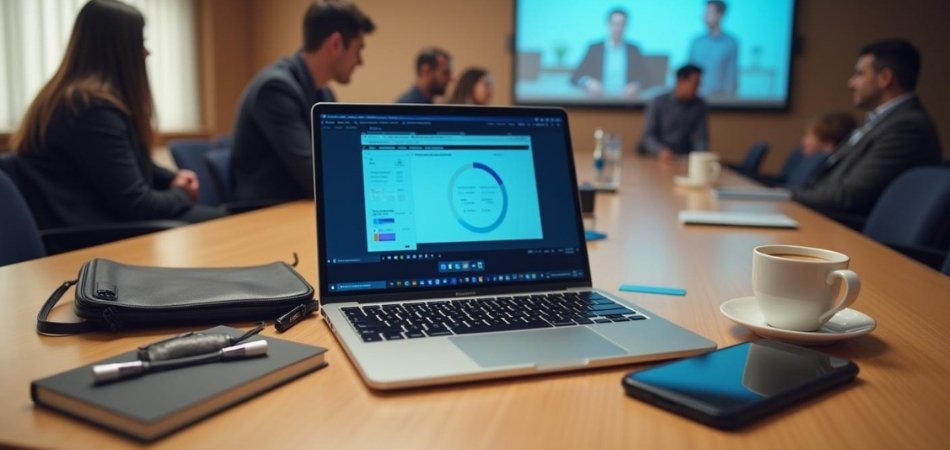Conferences are lively events where people gather to share ideas, learn new things, and build connections. With so much happening, many attendees think about what to carry with them. One thought often comes to their mind: should I bring my laptop to a conference?
Yes, you should bring your laptop to a conference if you need to take detailed notes, present material, or access work files. Laptops help with networking, on-the-spot sharing, and quick research. However, if weight, charging, or security are concerns, a tablet or smartphone can be a lighter alternative.
For anyone still curious about this topic, the details shared in this article cover everything you might want to know. From session types to device comparisons and even safety tips, you will find clear answers about bringing a laptop to conferences.
Should I Bring My Laptop to a Conference?
Bringing a laptop to a conference can feel like a big decision. Some people feel more comfortable having it with them, while others prefer traveling light. Before you decide, think about how you plan to use your time there. Let’s explore if it is really needed.
Note Taking
Many people use their laptops for taking notes during talks. It can be faster than writing by hand, especially if you want detailed notes. You can also organize your files, save links, or create quick drafts. But keep in mind, sometimes carrying a small notebook can be easier if you only need a few key points.
Access to Work
Conferences often bring sudden chances to connect work with new ideas. If you need to check documents, edit presentations, or share details with someone, having your laptop nearby is helpful. Without it, you may feel limited if those situations come up. It’s worth thinking about how much of your work may depend on it.
Networking Value
During conferences, you may meet people who want to see your work or a project on the spot. A laptop makes this simple since you can open files, show examples, or explain through visuals. It gives a stronger impression than only describing something. Still, only carry it if you think such chances are likely for you.
Travel Comfort
Carrying a laptop can add extra weight to your bag. If you have long days filled with sessions, walking around with a heavy bag can feel tiring. On the other hand, traveling without it makes moving easier. Always balance your comfort against the possible need to use the laptop.
Charging Issues
Conference halls may not always have enough charging spots. If your laptop battery does not last long, this can be frustrating. You might find yourself stuck near a wall outlet instead of freely moving around. A power bank is useful for phones, but for laptops, a good battery is what truly matters.
Presentation Needs
If you are a speaker or hosting a workshop, then your laptop is almost a must. You will need it to run slides, show videos, or handle your material smoothly. Borrowing devices in such cases can be risky, since settings may not match your needs. It’s always safer to bring your own.
Quick Research
Conferences often inspire sudden questions or new interests. Having a laptop makes it easy to search online or check your saved files quickly. For example, when attending upcoming international conferences, you may want to look up schedules or details right away. In those moments, the laptop can save you time.
Security Concerns
Laptops carry sensitive data. At crowded places like conferences, the risk of theft or damage is higher. You will need to stay alert or use secure lockers if provided. If you cannot guarantee safekeeping, it might be better to leave it at your hotel.
Alternative Devices
Sometimes a tablet or a good smartphone can cover what you need. They are lighter, easier to carry, and handle basic tasks like notes, emails, and online checks. If your laptop feels like too much of a burden, a smaller device might serve just as well for most conference activities.
Personal Preference
Eventually, the choice depends on your style of working. Some people feel lost without their laptop, while others enjoy being free of the extra load. Think about your priorities and the type of conference you are attending before making the final call.
Carrying a laptop to a conference has both benefits and drawbacks. Think carefully about your needs, comfort, and safety. Whatever you decide, make sure it helps you focus on learning, meeting people, and making the most of the event.
What Type of Conference Sessions Actually Require a Laptop?
Conferences have many different types of sessions, and not all of them need a laptop. Some sessions are just for listening or watching. But in certain cases, having a laptop is almost a must. Let’s look at those situations in detail.
Coding Workshops
In coding-focused workshops, participants often follow along with live coding examples. A laptop is needed to write code, test it, and see how things work in real time. Without a laptop, it’s tough to keep up or practice what is being taught.
Design Demos
Design sessions usually involve showing how tools like Photoshop, Illustrator, or Figma work. Attendees often open the same tool on their laptops and try the steps. This makes it easier to understand the process and learn by doing instead of only watching.
Hands-on Training
Some training sessions are built for practice, not just theory. For example, learning new software or exploring data analysis tools. A laptop allows participants to click, type, and try everything themselves, which makes the training more effective.
Technical Setups
There are sessions where people need to install programs, set up servers, or work with cloud platforms. Laptops make it possible to go through these setups right away. Without one, participants would have to wait until later, missing the real-time guidance.
Interactive Learning
In some interactive sessions, people join group tasks or challenges that need online access. A laptop helps with researching, sharing files, and working with digital tools. It keeps everyone involved and makes the activities more practical and fun.
Not every session needs a laptop, but when it comes to coding, design, training, or interactive setups, having one makes a big difference. It helps you stay involved, practice directly, and get the best out of the session.
Are Tablets or Smartphones a Good Alternative to Laptops at Conferences?
Choosing between a laptop, tablet, or smartphone for a conference often comes down to how you plan to use it. The table below compares each device in areas such as typing, portability, performance, and presentations.
| Aspect | Laptop | Tablet or Smartphone |
| Typing/Input | Comfortable, fast—with physical keyboards. Ideal for long notes or writing. | On-screen or optional tiny keyboards—fine for short messages or quick use. |
| Performance | Strong processors, good for multitasking and heavy software. | Great for light tasks like email, reading, or basic apps. |
| Software & Compatibility | Runs full desktop programs—more flexibility. | Uses apps. Some desktop tools may not be available. |
| Storage | Usually more built-in space for files and presentations. | Often limited storage; better with cloud access. |
| Portability | Heavier; needs bag, careful handling. | Lightweight and easy to carry—especially phones. |
| Battery/Startup | Needs more power; takes time to start. | Lasts longer and works instantly—great for jumping in fast. |
| Video Calls / Virtual Meetings | Good cameras and microphones—professional feel. | Tablets: good front cameras & mics; Smartphones: handy but small screen. |
| Presentation Use | Easier to connect to projectors, run slides. | Possible—especially with wireless casting—but often less smooth. |
From the comparison, it’s clear that laptops are better for heavy tasks and presentations, while tablets and smartphones shine when you want quick access, light travel, and simple communication. Choosing the right device depends on what you expect to do most at the event.
How Do You Keep Your Laptop Safe While Attending a Conference?
Conferences are busy places where people move around with bags and gadgets. While you meet new people and attend sessions, your belongings need extra care. A laptop is one of the most valuable items you carry, so keeping it safe matters a lot.
- Laptop Lock: Using a strong laptop lock lets you secure your device to a table or chair. Even if you step away briefly, this makes it harder for someone to walk away with it.
- Secure Bag: Carrying a padded and lockable bag keeps your laptop safe while moving between sessions. It also helps protect the device from bumps, scratches, or accidental drops during the rush.
- Never Unattended: Leaving your laptop alone in a conference hall or café is very risky. Even for a few minutes, someone could easily take it without you noticing.
- Close Monitoring: Always keep your laptop within reach or in line of sight. If you are sitting in a session, placing the bag near your feet is safer than behind the chair.
- Travel Insurance: Having travel insurance that covers electronics is helpful if your laptop is stolen or damaged. This step adds peace of mind while attending crowded events.
- Strong Passwords: Securing your laptop with a strong password prevents strangers from accessing files. If your device gets misplaced, this step protects important data from being stolen.
- Avoid Flashy Use: Using your laptop in crowded hallways or showing it off unnecessarily can attract attention. Keep its use limited to safe and suitable spaces.
Keeping your laptop safe is about staying alert, using simple tools, and being careful with where you place it. Small steps like locks, bags, and awareness can help you protect your device throughout the entire conference.
Do Different Countries Have Different Tech Expectations at Conferences?
Conferences across the world often reveal that technology is used in different ways. Culture, industry style, and audience habits all play a role in shaping these differences. These variations can influence how sessions are delivered, how people interact, and even how ideas are shared. Let’s look at how these expectations vary.
Presentation Style
In some countries, presentations are more formal with heavy use of slides and structured talks. In others, speakers might prefer a casual approach with fewer slides and more live discussions. This difference changes how the audience interacts during the session.
Live Demos
Some regions place more emphasis on live demos or tech tools. For instance, if you find professional conferences in Canada to attend, expectations may differ slightly from U.S. events. Canadian conferences may highlight polished talks, while U.S. events often encourage bold live testing.
Audience Interaction
In certain parts of the world, attendees expect active engagement like polls, quizzes, or open Q&A sessions. Elsewhere, people may prefer to sit back and listen without too many interruptions. These differences often reflect local cultural habits and comfort levels.
Tech Tools
The tools used during sessions can vary a lot. In some countries, event apps, QR codes, and digital networking platforms are common. In others, simple email or printed material still plays a big role. This shapes how participants prepare for the event.
Training Sessions
Hands-on training also shows differences. In tech-heavy countries, attendees may expect advanced software setups and guided labs. In places with lighter tech use, training might focus more on theory or step-by-step demonstrations instead of complex interactive practice.
Every country has its own style of mixing technology with conference learning. These differences make each event unique, and knowing about them helps participants prepare better and enjoy the experience more.
How Do Charging Stations and Power Access Affect the Need for a Laptop?
Attending a conference with a laptop can seem practical, but power availability often changes the experience. Some venues provide plenty of outlets, while others have limited charging spots. This small detail can determine how useful a laptop really is.
Limited Outlets
Not every conference venue has plenty of charging points. Some halls or meeting rooms may only have a few, and those fill up quickly. In such cases, using a laptop for long hours becomes harder, especially if your battery drains fast.
Power Stations
Larger conferences sometimes set up special charging stations in open areas. These spots are helpful, but they are often shared by many people. Attendees may need to wait for a turn, which can interrupt their focus or limit laptop use during sessions.
Battery Planning
When outlets are scarce, battery planning becomes important. People may choose to bring smaller devices like tablets instead of laptops. Others carry power banks to stay prepared. This planning often decides whether a laptop is worth carrying for the day.
Session Length
Longer sessions make power access more important. If workshops last several hours, laptops can run out of charge halfway through. Without a nearby outlet, it’s difficult to participate fully, making shorter sessions more manageable without constant charging.
Venue Setup
The design of the venue also plays a role. Some modern spaces have built-in plugs or USB ports at every seat, while older halls may not. This difference changes how confidently people can bring and use laptops throughout the event.
Charging options can change how useful a laptop really is at a conference. Venues with limited power access may push people to rethink their choices, while well-equipped places make laptops easier to rely on.
Should You Factor Tech Costs Into Your Conference Planning?
Planning for a conference is not only about tickets, hotels, and travel. Technology plays a big role in how comfortable and productive you will be. If you overlook these costs, you may end up unprepared. Let’s see why tech costs matter.
Device Essentials
Bringing your laptop, tablet, or smartphone is common for conferences. But keeping them safe, charged, and working well often means spending extra. Cases, chargers, and even small accessories can add up, so they deserve a place in your plan.
Accessories
Small tools like adapters, cables, wireless mice, and headphones seem minor but are very useful. Buying them at the last minute can be costly. It’s smarter to include them early in your conference budget so you avoid paying higher prices later.
Power Backup
Long conference days often leave you with drained batteries. Portable chargers and spare laptop batteries are very handy. When estimating the average budget for attending a conference, don’t forget things like portable chargers, adapters, or even protective laptop cases.
Internet Access
Many events offer free Wi-Fi, but it may not always be reliable. Some people buy mobile hotspots or extra data plans. While this adds cost, it ensures you can work or connect without depending fully on the shared conference network.
Software Needs
Some conferences require tools for presentations, note-taking, or online meetings. Subscriptions or one-time purchases for these apps can affect your spending. Thinking about this in advance helps you avoid sudden expenses when you realize a tool is needed.
Factoring tech costs into your conference planning makes the whole experience smoother. From devices to the internet, every small step adds comfort and saves stress. Planning ahead ensures you stay ready and avoid spending extra without warning.
FAQs About Should I Bring My Laptop to a Conference?
Conferences can feel exciting, but also raise many small questions about what to carry and how to prepare. A laptop is one of the most debated items. Below are some common questions and clear answers to help you make better decisions.
Is a Laptop Needed for Virtual Conferences?
For virtual events, a laptop is often more helpful than a phone. It gives you a bigger screen for watching sessions, joining video calls, and using chat features. You can also open documents or take notes side by side. While not a must, it makes the online experience smoother.
Can I Use Cloud Storage Instead of Carrying Files?
Yes, cloud storage is a smart way to avoid carrying heavy files on your laptop. You can upload your important presentations, notes, or reports before the event. This way, you only need internet access to get them back. It also keeps your work safe if your device fails.
Should I Bring a Lightweight Laptop?
A lighter laptop is easier to carry during long conference days. It reduces the weight of your bag and makes moving between halls less tiring. Even small laptops can handle tasks like notes, browsing, and presentations. If you own one, it’s often the better choice for travel.
Are Conference Apps Enough Without a Laptop?
Many events have apps for schedules, networking, and updates. These apps work well on phones and tablets. However, they usually don’t replace the need for tasks like editing files or giving detailed presentations. Apps are helpful, but they work best as a support tool.
How Can I Stay Productive Without a Laptop?
If you decide not to bring a laptop, plan how you will manage tasks. A tablet or smartphone with a keyboard attachment can help. Carrying a notebook for quick notes also works. The key is to keep your tools simple but reliable for your needs.
Do Conference Wi-Fi Networks Affect Laptop Use?
Yes, Wi-Fi quality makes a big difference. A strong and stable connection lets you use your laptop freely for emails, downloads, or online tools. Weak Wi-Fi, on the other hand, can make laptops less useful. Always have offline files ready just in case.
Should I Bring Extra Storage Devices?
Carrying a USB drive or a small external hard disk can be helpful. They let you share files quickly if internet access is slow. You can also back up important data during the event. It adds a little weight, but it gives peace of mind.
What If I Only Want to Attend Social Events?
If your main goal is networking during breaks or after-parties, a laptop may not be needed. Business cards, a phone, or a small tablet are usually enough. Laptops in these settings can feel unnecessary and heavy. Think about your main purpose before packing.
Can Laptops Distract During Sessions?
Sometimes, yes. Typing on a laptop during talks can distract both you and others nearby. You may end up checking emails instead of listening. If you tend to get distracted, a notebook or tablet might help you stay more focused.
Conclusion
When weighing the pros and cons, the answer depends on what you plan to do most during the event. A laptop can be valuable for deep work, presentations, and technical sessions, while lighter devices often make traveling simpler. So, if you are asking should I bring my laptop to a conference?” the short answer is yes if you need it for serious work, and no if your focus is only on light tasks and networking.
At the same time, whatever device you choose, remember a few basics: keep it charged, carry a secure bag, and stay mindful of safety. Plan your tech setup early, pack only what you’ll truly use, and focus on building connections. Wishing you a productive and enjoyable conference ahead.









